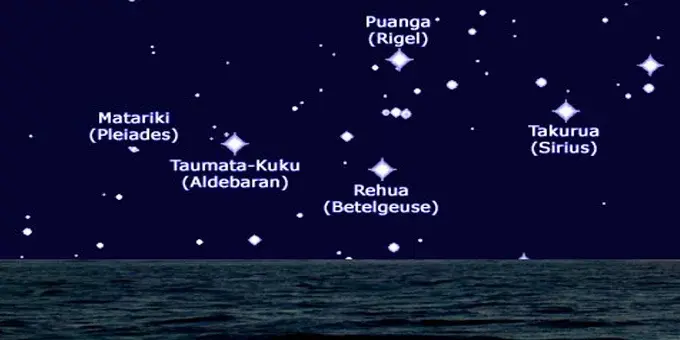
Puanga: The Star That Guides Us. Celebrating Indigenous Language, Culture and Remembering Our Ancestors.
Dr. Julian Wilcox
Puanga: The Star That Guides Us. Celebrating Indigenous Language, Culture and Remembering Our Ancestors.
A star’s heliacal rising symbolises a new phase in our traditional calendar. It’s Puanga, known internationally as Rigel. Like Matariki (Pleiades) Puanga heralds the new year, especially for many Māori on the west coast of Aotearoa New Zealand. Across the Pacific, this time marks more than just the start of a seasonal cycle. It is a sacred space for reflection, renewal and remembrance. A time to honour those who have passed and to carry their legacies forward.
The rising of Puanga signals transition, from the old to the new. It is a beacon of regeneration and reconnection. It guides the planting of crops, the telling of stories and the gathering of whānau (family). Within Indigenous knowledge systems, the sky is not simply a backdrop to our lives. It is a living map, filled with ancestors, teachings and truths.
Puanga reminds us of those who are no longer with us. It acknowledges the wairua (spirit) of our ancestors and leaders whose presence continues to guide and protect us. It is a time to pause, to reflect, to honour and to ensure their stories are carried into the future.
In this spirit, we remember Patagaw Talimalaw, a passionate Indigenous broadcaster who was instrumental in the growth of the World Indigenous Broadcasters Network (WIBN). Patagaw helped shape a platform that aspired to see and hear our stories reach global audiences. Her commitment and influence continues to ripple across our collective media whānau.
We also remember those Māori leaders who carved pathways for Indigenous broadcasting. Chief among them is our kaumātua (elder), the late Dr Huirangi Waikerepuru, a man of vision, deep cultural grounding and unwavering commitment to the Māori language. I will never forget seeing him in Taiwan in 2010, hoisted aloft on a chair by our Taiwanese relations in a joyous celebration of kinship. Nor will I forget the passing of the waka huia (traditional treasure box) from Whakaata Māori to TITV. The spiritually moving hongi (pressing of noses) between Huirangi and Hereditary Chief Haku Dumaladas of Kasavakan, a master of the Pinuyuman language.
These moments speak not just to ceremony, but to legacy.
As Indigenous broadcasters, we must never forget our individual and collective legacies. Not just the establishment of WIBN, but the long line of storytellers, language champions and media pioneers who laid the foundations for our work. Indigenous broadcasting is rooted in resistance. A fight for self-determination, cultural survival and narrative sovereignty.
WIBN was born from that struggle, with a clear and powerful purpose. That is to unite Indigenous broadcasters, support one another’s stories, and amplify voices too often sidelined in mainstream media. It stands as a testament to what we can achieve when we work together, across oceans and languages, bound by shared focus. We all need that now, more than ever, in the face of international geopolitical unrest and uncertainty.
Yet as we honour the past and struggle with the present, we must also look ahead. How do we move forward, together, as Indigenous broadcasters? How do we build on the foundations we’ve inherited, while embracing new technologies and continuing to tell stories grounded in tikanga (customary practice and protocol), integrity and truth?
For me, the path ahead calls for unity, creativity and a deep recommitment to our shared Indigenous values. It calls us to nurture the next generation of Indigenous journalists and media makers. To widen the spaces where our stories are not only heard but lead.
This article is just the beginning of a few ponderings. I plan to contribute more reflections on the vital role Indigenous media plays in sustaining our languages, strengthening our cultures and connecting our communities. Together, through Indigenous journalism and storytelling, we can keep strengthening our voices and ensure that our traditional narratives, pertaining to things like Puanga, continue to guide us. Not only in and amongst the celestial bodies in the sky but in everything we do.
A respected elder, Rereata Makiha, once told me that we cannot celebrate Puanga if we do not practice its values on the ground. For him, that meant gathering with the wider community to prepare the māra (gardens) for the season ahead. In that same spirit, while we tend to our local, regional and national needs, we must also tend to our international partnerships. Perhaps then, by the time Puanga next rises again, we will have cultivated a harvest rich with greater meaning. A diverse, vital offering to all Indigenous peoples across the world.
Puanga isn’t just a time for reflection. It is a time for recommitment. Recommitment to our languages, not just as mediums of communication, but as living vessels for truth. Recommitment to our stories, not just as content but as carriers of identity, justice and survival. And a recommitment to each other, as Indigenous broadcasters, as content makers and as an international whānau.
As Puanga rises, let it not only signal a new year. Let it ignite a renewed purpose. It reminds us that our path is not new. It is ancient. It is ours to follow, together.
